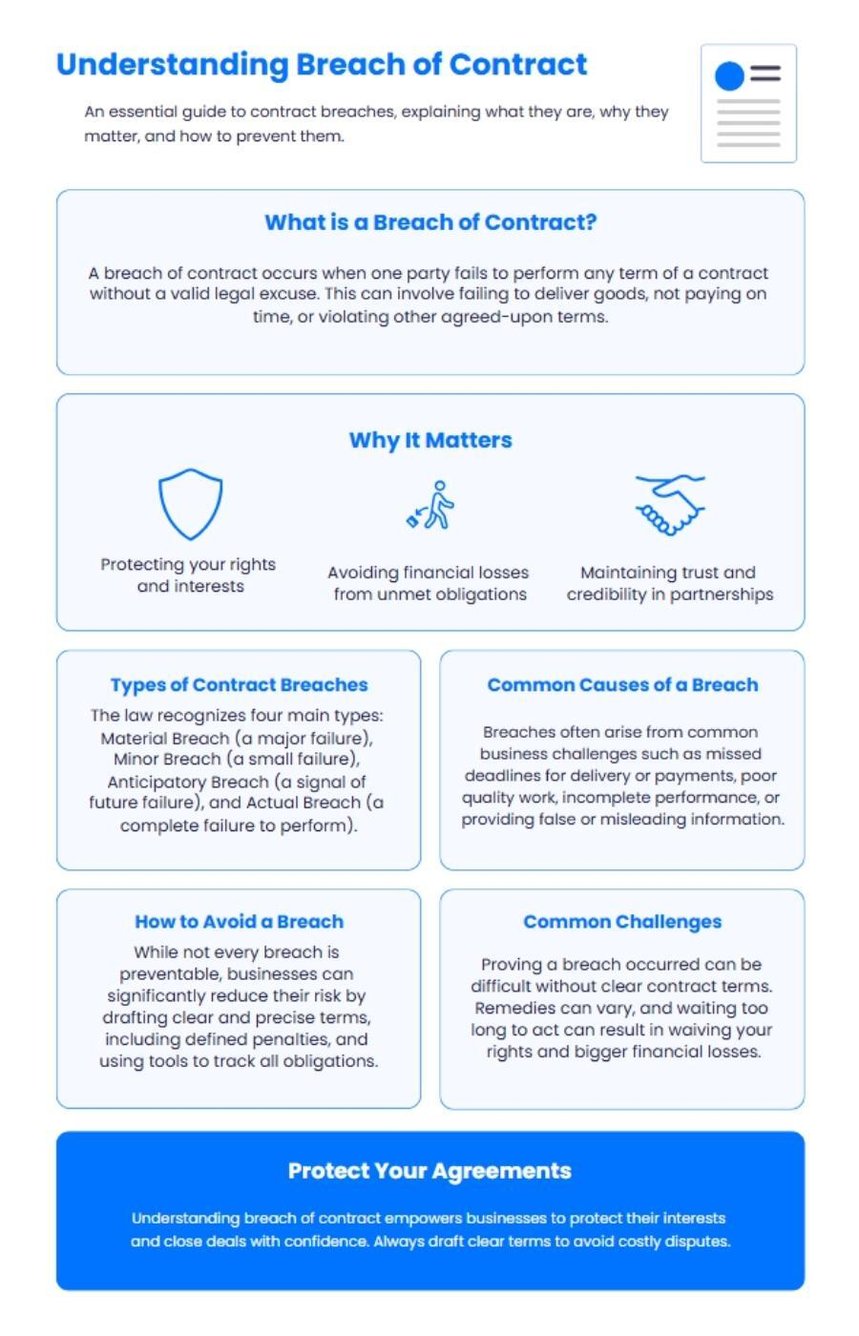
Dealing with breach of contract is a crucial aspect of any business transaction. When one party fails to fulfill their obligations as outlined in a contract, it can lead to disputes, financial losses, and damaged relationships. Understanding the concept of breach of contract is essential for protecting your business interests and ensuring smooth operations.
Breach of contract can derail deals, damage relationships, and create costly legal battles. Understanding what it is—and how to prevent it—empowers businesses to protect their interests and close agreements with confidence.
Breach of Contract Definition
Breach of contract occurs when one party fails to perform any term of a contract without a valid legal excuse. This can involve failing to deliver goods or services as promised, not paying on time, or violating any other terms agreed upon in the contract.
Types of Contract Breaches
Not every breach is the same. The law generally recognizes four types:
- Material Breach—A major failure that undermines the core purpose of the contract (e.g., a contractor not completing a project).
- Minor Breach (Partial Breach)—A small failure that doesn’t void the contract but still causes disruption (e.g., late delivery of goods).
- Anticipatory Breach—When a party signals they won’t fulfill obligations in the future, allowing the other side to take action before the deadline.
- Actual Breach—A complete failure to meet contractual obligations, often leading to legal or financial remedies.
Why It Matters
Understanding breach of contract is crucial for businesses, as it helps in:
- Protecting your rights and interests: Quickly identify when another party isn’t honoring the contract and take action before the problem escalates.
- Avoiding financial losses: Prevent missed payments, undelivered goods, or unmet service obligations from impacting your bottom line.
- Maintaining trust and credibility: Demonstrating you can enforce and honor agreements builds stronger, longer-term partnerships.
What Causes a Breach of Contract?
Breaches often arise from everyday business challenges. Common causes include:
- Missed deadlines for product delivery, services, or payments
- Non-payment of agreed-upon fees
- Poor quality work or goods below the promised standard
- Incomplete performance, where obligations are only partially fulfilled
- Misrepresentation, such as providing false or misleading information that influenced the agreement
How Breach of Contract Occurs
When a breach of contract occurs, the affected party can take legal action to enforce the terms of the contract or seek compensation for damages. Utilizing tools like TrustMark™ or Trust Badges can help in monitoring and managing contracts effectively, reducing the risk of breaches.
Breach of contract can happen in several ways:
- Failure to perform: A party doesn’t meet their obligations within the agreed timeframe.
- Defective performance: The service or product delivered doesn’t meet the quality or specifications outlined in the contract.
- Anticipatory breach: A party indicates—through words or actions—that they won’t fulfill their obligations in the future.
Common Challenges in Breach of Contract
Remedies for breach of contract can include damages, contract termination, or specific performance.
-
Proving breach: Without detailed contract terms and tracking, it’s difficult to show a violation occurred. Solution: Keep contracts benchmarked and certified for clarity and trust. Documentation and benchmarking are crucial to establish proof.
-
Varied remedies: Courts may allow damages, cancellation, or specific performance, depending on the contract and jurisdiction. Solution: Use standardized, fair terms that are easier to enforce.
-
Delayed action: Waiting too long may waive your rights, which can result in bigger losses. Solution: Monitor agreements proactively to catch risks early.
Try TermScout Certify™
Analyze, benchmark, and certify your contracts to reduce friction and close deals 3x faster.
Get Started NowHow to Avoid a Breach of Contract
While not every breach is preventable, businesses can reduce risk by:
- Drafting clear and precise terms
- Including defined penalties and dispute resolution methods
- Tracking obligations with AI-powered tools like TermScout TrustMark™
Breach of Contract Frequently Asked Questions
What is considered a breach of contract?
A breach of contract is when one party fails to fulfill their obligations as outlined in the agreement without a valid legal excuse.
What are the consequences of breaching a contract?
Consequences of breaching a contract can include legal action, financial losses, damaged relationships, and potential compensation for damages.
How can a breach of contract be legally defined?
A breach of contract is legally defined as the failure of one party to perform any term of the agreement without a valid legal excuse.
What are the potential remedies for breach of contract?
Potential remedies for breach of contract may include enforcing the terms of the contract, seeking compensation for damages, or renegotiating the agreement.
What are the key elements that constitute a breach of contract?
Key elements of a breach of contract include the existence of a valid contract, failure to perform obligations, and lack of a valid legal excuse for non-performance.
Can a breach of contract be resolved without going to court?
Yes, breaches of contract can be resolved through negotiation, mediation, or arbitration without the need for court involvement in some cases.
How do you prove a breach of contract?
The legal elements of a breach of contract typically include the existence of a valid agreement, evidence of breach, lack of a valid excuse, and measurable damages or harm caused by the breach.
Can you give an example of a breach of contract?
Yes. Imagine a manufacturer contracts a supplier to deliver 1,000 custom parts in 60 days. The supplier delivers only 600 late, causing revenue loss. This is a classic breach of contract scenario.

Explore More Contract Insights
Get benchmarks, FAQs, and clear explanations that make contracts more transparent.
Visit Hub.png?width=130&height=53&name=Vector%20(21).png)